Статьи журнала - Arctic and North
Все статьи: 972
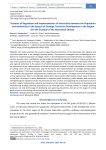
Статья научная
The study examines the issues of organizing the interaction of the population with regional and municipal authorities in the strategic planning system. The research investigates the methodological foundations for implementing tools to engage citizens in the development and implementation of strategic documents, presents their classification, and describes the specifics of regulatory control in Russian practice. As part of the practical study, an analysis of the regulation and implementation of public interaction with local and regional authorities in the system of territorial development of the Murmansk Oblast was carried out, an assessment of the implementation of formal and informal methods of public participation in the system of solving issues of local importance and the formation and implementation of strategic planning documents was given. It has been concluded that, despite the positive assessment of the experience of interaction between the population and government authorities in the system of strategic territorial development at the regional level, there is considerable potential for improving the effectiveness of such tools at the municipal level. At present, it seems appropriate to optimize public discussions, public debates, and surveys by strengthening the regulation of the requirements for their conduct and regulating the procedure for recording their results, implementing collective participation of the population in the processes of developing and implementing strategic planning documents at the municipal level, involving citizens in strategic planning processes not only at the stage of developing and approving documents, but also at the stages of setting goals, as well as monitoring and controlling their implementation.
Бесплатно
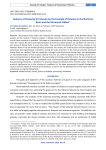
Статья научная
The purpose of the study is the rationale for creating a fisheries cluster in the Northern Basin. The analysis of the creation of classical clusters in foreign countries is carried out, information on the limited use of these structures is provided. The stages of clusterization of the fishing industry in Russia are considered. The reasons for the lack of implementation of numerous cluster projects are clarified. The main one is the refusal of fishing fleets to enter the cluster. The successful functioning of the fishery complex in the Northern Basin in the pre-market period is presented. The reasons for its destruction and the stagnation of enterprises and organizations' economies serving the main structures of the marine economic activity of fishing fleets are clarified. They are caused by a change in the structure of mining fleets, the development of uncontrolled export of fish products directly from the sea, with the departure of fishing vessels for repairs and maintenance to foreign ports. The practicality of creating a local fish cluster, the core of which will consist of fishing vessels with an incomplete cycle of processing aquatic biological resources and coastal fish processing enterprises, is justified. The proposed measures stimulate entry into the cluster. The study's practical significance lies in the creation of conditions for the deep processing of aquatic biological resources and the release of innovative fish products, as well as for the development of ship repair and other enterprises serving the fishing fleet.
Бесплатно
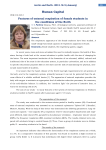
Features of external respiration of female students in the conditions of the North
Статья научная
The respiratory apparatus of the female students have been studied. A small voltage functional capacity of respiratory apparatus is found.
Бесплатно
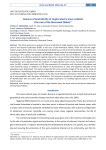
Features of local identity of single-industry town residents (the case of the Murmansk oblast)
Статья научная
The article presents an analysis of the local identity of single-industry town residents in the Arctic zone of the Russian Federation (AZRF) in the case of the Murmansk Oblast, which has half the single-industry towns of the Arctic zone. Considering local identity as a part of territorial identity, the authors present it as a symbolic space for creating and strengthening the sense of territorial identity. At the same time, according to the authors, the people's identification related to the area of residence contributes to the construction of an effective system of regional interaction. It is one of the critical factors for the sustainable development of territories. According to the results of the study, positive and negative factors of identity manifestation were obtained from the residents of single-industry towns of the surveyed area (questionnaire (n=428), in-depth interviews (n=12)); the assessment of connection with the place of residence and socioeconomic status of residents, the degree of attractiveness of cities and migration attitudes of the population were determined. The authors argue that the socioeconomic image of the area in the minds of its residents is developing along with the manifestation of their rootedness. A distinctive feature of the local identity of single-industry town residents in the Murmansk Oblast is well-being. It determines the visibility of communication with the place of residence. The increase in prosperity is proportional to the growth of identification with the town, and it is of strategic importance for building regional policies in single-industry towns.
Бесплатно
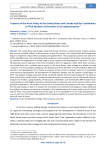
Статья научная
The United States and Canada, along with Russia, Denmark, Iceland, Norway, Finland and Sweden, are the so-called "official" Arctic countries. In the 21st century, The United States and Canada have begun to implement national Arctic strategies and updated them. The accepted documents have both similarities and differences. The United States and Canada are active members of the Arctic Council and view it as a platform for negotiations on a wide range of issues related to the development of the Arctic. The United States has come a long way in the Arctic, including in terms of regulation. Unlike other Arctic countries, the United States has a minimal area of access to the Arctic Ocean, their strategy as a whole is turned “outward”. The first Canadian strategy for the development of the Northern Territories (2013) is addressed directly to the development of the northern periphery of the country, formulates tasks for its sustainable socio-economic development, the development of indigenous peoples, and the support of sovereignty. In 2019, the updated strategy presented already combined national and international goals for the development of the Arctic and the North. To advance national interests in the Arctic, the US and Canada have developed and funded a geographically, infrastructure, stakeholder, and thematically differentiated Arctic research policy in which higher education institutions play an important role and are used to reinforce their geopolitical aspirations. The purpose of the article is to characterize the features of the Arctic strategies of the USA and Canada, as well as to analyze the contribution of universities and colleges in Alaska (USA) and the northern territories and provinces of Canada to the implementation of research policy in the Far North and the Arctic. The practical significance of the paper is in the possibility of its use in the educational process, as well as for the analysis and updating of international aspects of research activities by universities in the Arctic zone of Russia.
Бесплатно
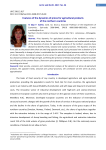
Features of the dynamics of prices for agricultural products of the northern countries
Статья научная
Price dynamics for agricultural products of the northern countries is determined by many factors. The methods of economic and mathematical analysis of the dynamics of prices for agricultural products of the northern countries have allowed to identify trends, seasonal and cyclical processes. The dynamics of prices from 1991 to the present time there are two long opposite trends. Cyclic processes have a duration of 2–4 years. Seasonality in change of prices is sustainable due to natural biological processes under the influence of climatic factors. Correlation analysis of price series for agricultural products of the northern countries has showed connection of high strength, confirming the presence of trends and periodic components under the influence of the common factors. Short-term price dynamics approximation shows the retention of the increasing price trend.
Бесплатно
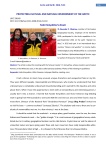
Статья научная
The article is about the meeting with the famous traveler F.F. Konyukhov, whose ancestors were Russian Pomors, in the White Sea coast, in the place called Letnyaya Zolotitsa. Photos of the meeting are published.
Бесплатно
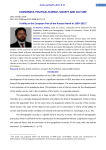
Fertility in the European Part of the Russian North in 1990–2015
Статья научная
Based on the Federal State Statistics Service data, the article examines the dynamics of changes in the system of indicators characterizing the birth rate in the regions of the European North of Russia (including urban and rural areas). General and special demographic methods were used for the analysis. In the course of the work it was revealed that by 1999 the number of births in the regions of the European North of Russia had greatly decreased, but by 2015 fertility rates had improved, although the birth rate had worsened. At the same time, the birth rate in the regions of the European North of Russia in general is higher than the average for Russia, but the reproduction of the population has been narrowed for quite a long time already. Finally, the differences between the urban and rural areas are large. In relation to the latter, it is possible to assume the existence of certain problems related to the collection of information.
Бесплатно
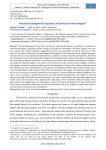
Financial Development Trajectories of the Russian Arctic Regions
Статья научная
Priority development of the Arctic territories is particularly relevant in conditions of unstable environmental balance, significant climate change, and territorial vulnerability. The Arctic regions have common natural and climatic conditions, geographical location, the availability of natural resources on their territory, the level of technical and technological development of the branches of the national economy, however, they are characterized by heterogeneous conditions of socio-economic development, therefore, the imbalances in the functioning of these regions are manifested more clearly. Elimination or levelling of the emerging interregional imbalances is an objective necessity for the sustainable development of regions, ensuring their financial stability. The authors, on the basis of private financial indices (budget, economic, investment), carried out a pinpoint adjustment of the development of the Arctic territories and determined the trajectories for the implementation and expansion of potential financial opportunities, taking into account the identified threats and drivers that affect the economy of the region. This approach made it possible, firstly, to assess the financial capabilities of the regions in terms of different aspects (budgetary, economic, etc.,); secondly, to identify the dynamics of their financial development; and, thirdly, to rank the regions according to the level of financial solvency. As a result, three clusters were identified: regions with a high value of the economic index; regions with a high value of the investment index and regions with a high value of the budget index. For each group, a vector of financial development has been determined, which makes it possible to effectively use all the possibilities of the Arctic regions to ensure their both social and financial and investment development.
Бесплатно
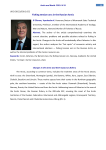
Fishing tension arcs in the Russian Arctic
Статья научная
The author of the article comprehensively examines the current situation, problems and possible solutions related to fishing in the Arctic. Changes in the Arctic will undoubtedly affect fisheries. In this regard, the author analyses the "hot spots" of economic activity and international relations — fishing tension arcs in the Russian Arctic, as well as the internal problems of the marine resource use.
Бесплатно
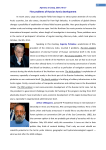
Five problems of Russian Arctic development
Статья научная
In recent years, Large circumpolar fields have begun to attract great attention of not only Arctic countries, but also states, situated far from high latitudes. In conditions of global climate changes a possibility of exploitation of these fields became possible. Here great deposits of hydrocarbon crude and mining materials are open. And the Northern Sea route promise to become the international transport corridor, where length of investigation is increasing. These problems were in the center of participants’ attraction of regular meeting «Mercury club», which took place in October, the 8th, 2014.
Бесплатно
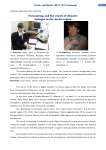
Forecasting and the results of climatic changes in the Arctic region
Статья научная
The article defines the role of the Arctic region. The causes of climatic changes have been studied. The statistics of changes in key climate indicators is written. A mathematical model of a polynomial trend of the minimum area of Arctic sea ice is created.
Бесплатно
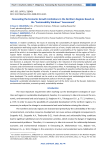
Статья научная
In modern conditions, the issues of assessing the sustainability of regional development are of particular relevance. The complex problems of interrelation of economic growth, environmental pollution and population well-being require the development and use of new, simpler and more understandable approaches for decision makers to assess, analyze, and predict sustainability at the regional level. The purpose of the article is to investigate the opportunities for sustainable development of the regions of the European North included in the Arctic zone, and to develop methods for forecasting their socio-environmental and economic development based on sustainability window assessment. The dynamics of changes in the relationship between environmental, social and economic indicators with the use of pollution functions is analyzed. The main factors contributing to the reduction of environmental pollution and increase of the population's well-being are identified. It is shown that structural changes in the regional economy and environmental investments have the greatest effect. A methodology for calculating sustainability windows for the regional economy is presented. The possibility of using the method has been demonstrated using data from the Republic of Karelia. A scenario of sustainable development based on the restriction of economic growth for some regions and the requirements for the structure of the economy has been developed. The results obtained can be used as an informational and methodological basis for assessing and elaborating sustainable development policies in the Arctic regions.
Бесплатно
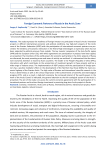
Foreign Economic Partners of Russia in the Arctic Zone
Статья научная
The study expresses the readiness of foreign investors to participate in Russia's Arctic innovation projects in difficult international economic and political conditions. Key high-tech projects of the Arctic zone of the Russian Federation (AZRF) with the participation of international economic partners are presented. The tendency of economic interaction in the field of high technologies is expressed, which has not been subjected to political pressure from outside. The key investor companies of the Asia-Pacific region (APR) and the European Union (EU), with which agreements on participation in projects have been signed, are presented. The intentions of the world powers for economic partnership in the Arctic projects of Russia are discussed, the most promising areas and areas of activity are outlined. It is determined that the dominant economic attention is shown by Asian countries. The leader is the People's Republic of China (PRC), interaction with which contributes to the acceleration of investment growth in these projects and has a wide range of industry areas. The implementation of AZRF projects with the participation of foreign partners has a positive multiplier effect on the development of the Northern Sea Route (NSR), the main economic highway of the Russian Arctic. The high value of Russian and international scientific research in the Arctic is determined, as well as the critical importance of the achievements of scientific and technological progress (STP), and as a result, a high-tech economy; the increased interest of the world powers in the work of the Arctic Council is indicated; the general attention to the thin ecological system of the Arctic is presented. The aim of the study is to assess the current economic agreements with the participation of international partners and to attract foreign investment in promising long-term Arctic projects in Russia.
Бесплатно
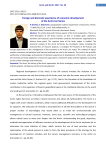
Foreign and domestic experience of economic development of the Arctic territories
Статья научная
The article deals with the key aspects of the Arctic exploration. There is a brief description of the Arctic Council, as well as strategic goals, objectives, activities and resources used of member countries and observer organizations to achieve these goals. The resource base of the Arctic region is studied. The economic analysis of the Arctic territories by circumpolar states, including the characteristics of resource projects, is arranged. The features of the Russian and foreign approaches to the management of the economy in the Arctic are noted. The method of logical analysis, economic and statistical and historical methods are used in the research. The result is the scientific justification of advantages and potential of domestic experience of development of the Arctic, and also of the necessity of timely adaptation of economic approaches, investment policy and the legislation according to the current chalenges and tendencies.
Бесплатно
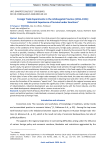
Статья научная
Based on historical material, the article presents the regional experience of searching for a model of economic development on the example of the Arkhangelsk Province's desire to get rid of the image of a “resource province” in the context of the growing importance of this region for the state. The article considers the period of the military-revolutionary era and the early NEP, which is short by historical standards, when, in the conditions of the inaction of other Russian ports, foreign policy sanctions, and a “trade blockade”, the economically active community of Arkhangelsk sought to diversify the economic life of the region as much as possible, choosing a different vector of further development. The author noted the forms of responding to the challenges of the era that forced look for new ways of solving problems. There is a desire to find its way for the Arkhangelsk Province within the framework of a single state, and the unification of the European, Ural, and Siberian territories gravitating towards the White Seaports. These issues should be considered in terms of only economic interregional cooperation. Among the variety of development projects, the foreign trade aspect was selected for consideration. During the study, the general motivation for planning foreign trade activities through Arkhangelsk changed. In the conditions of post-revolutionary devastation, the main motivator is the food supply of the population, which could return the value of raw materials to the region, while making it more dependent on external partners. In these circumstances, the local commercial and industrial community was ready to give up part of their rights in favor of the state foreign trade monopoly. On the other hand, the state was ready to transfer part of its powers so that local authorities interested in obtaining food and other items of life support ensure the formation of the necessary “export fund”. Thus, projects to diversify the regional economy were thwarted; in the 1920s the province retained the significance of the “all-Russia sawmill”; during the period of industrialization, industrial development was also associated mainly with the forest industry, and this one-sided development subsequently led to a severe structural crisis.
Бесплатно
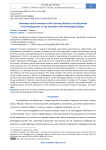
Статья научная
Territorial development is aimed at identifying and actively using resources, opportunities, and socio-economic potential to improve the quality of life of the population, increase attractiveness among investors, tourists, and representatives of economically active social groups. The complexity of territorial development is that it is necessary to take into account a large number of external factors, such as the political and economic situation in the country and the world, socio-demographic processes, the spread of modern information technologies, and much more. It is impossible to ignore the internal characteristics of the territory: its history, natural and climatic features, level of urbanization, resource potential, dynamics of social processes, etc. The diversity of relationships and contradictions between the external and internal environment of the territory complicates the process of territorial development. To overcome these contradictions, it is necessary to form a holistic image or brand of the territory aimed at the most complete and effective use of the resource potential. This article considers the process of formation and promotion of the territory brand as a tool for its development. The problems hindering the effective branding of the territory have been identified. The SWOT-analysis of the Arkhangelsk Oblast is carried out on the basis of the generalization of statistical data characterizing the socio-economic situation of the region. Proposals aimed at overcoming the problems of territorial brand development, related to the implementation of a targeted program of public involvement in the formation of an attractive image of the region, are developed.
Бесплатно
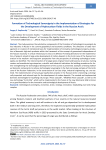
Статья научная
The study examines the substantive components of the formation of technological sovereignty by key industries in Russia in the current geopolitical and economic conditions. The directions of state management on creation of institutional basis for implementation of innovative technological projects, production of domestic high-tech products within the framework of the concept of guaranteed independence of the Russian economy in critical infrastructure areas are defined. Promising directions for the implementation of projects aimed at large-scale development of carbon deposits in the Arctic zone of the Russian Federation in the medium- and long-term perspective from the perspective of achieving technological sovereignty are identified. The interconnection of strategic plans of government and business structures, training centers and manufacturing enterprises, scientific and industrial institutions for building procedures for further strengthening the technological development of the country is presented. Examples of testing individual domestic components to achieve technological sovereignty in the fuel and energy complex of the Arctic zone of the Russian Federation, in the construction of ice-class ships, industrial engineering, etc. are outlined. The implementation of natural gas liquefaction projects in the Russian Arctic is becoming a strategically important and relevant topic for the development of carbon deposits. The created and implemented domestic technologies for liquefying natural gas “Arctic Cascade”, “Modified Arctic Cascade”, as well as the new technology “Arctic Mix”, which will be implemented in the future at the new Murmansk LNG terminal, are a good foundation for the innovative and technological development of Russia.
Бесплатно
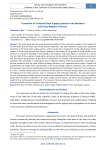
Formation of Territorial Heat Supply Systems in the Northern and Arctic Regions of Russia
Статья научная
The article deals with the most important problems of the communal complex in the subjects of the Far North and the Arctic zone of the Russian Federation. The main attention is paid to the aspects of formation of territorial heat supply systems, which are the basic components of the infrastructure of life support in harsh polar natural and climatic conditions. The impact of the growth of utility tariffs on the structure of consumer spending of households in the northern and arctic regions is assessed. It is shown that the state of the municipal energy sector determines the formation of the socio-economic environment and investment attractiveness of the Arctic municipalities. Its renewal and modernization are the main conditions that contribute to reducing the rate of migration outflow of the local population, increasing industrial production and the state military–strategic presence in this important macro-region. Despite the predominance of energy sector specialization in the list of leading industrial enterprises, the presence of the necessary fuel and raw materials base and increased inflow of investment resources in the energy sector, there is further obsolescence and reduction of fixed assets of municipal energy supply units as well as the highest level of utility consumer costs in comparison with all-Russian indicators. The conclusion about the loss of previously available territorial infrastructure advantages of the Russian Arctic regions is substantiated: there has been a reduction in the total number of heat sources, territorial energy production, the length of heat communication networks. The increase of these energy threats is a factor limiting the socio-economic growth of Russia’s northern and arctic territories.
Бесплатно
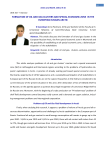
Formation of oil and gas clusters and special economic zon in the Euro-pean Russian Arctic
Статья научная
This article discusses the formation of oil and gas clusters in the European Russian Arctic, the Port special economic zone in Murmansk and the possibility of establishing an oil special economic zone, a balanced participation of the stakeholders
Бесплатно

